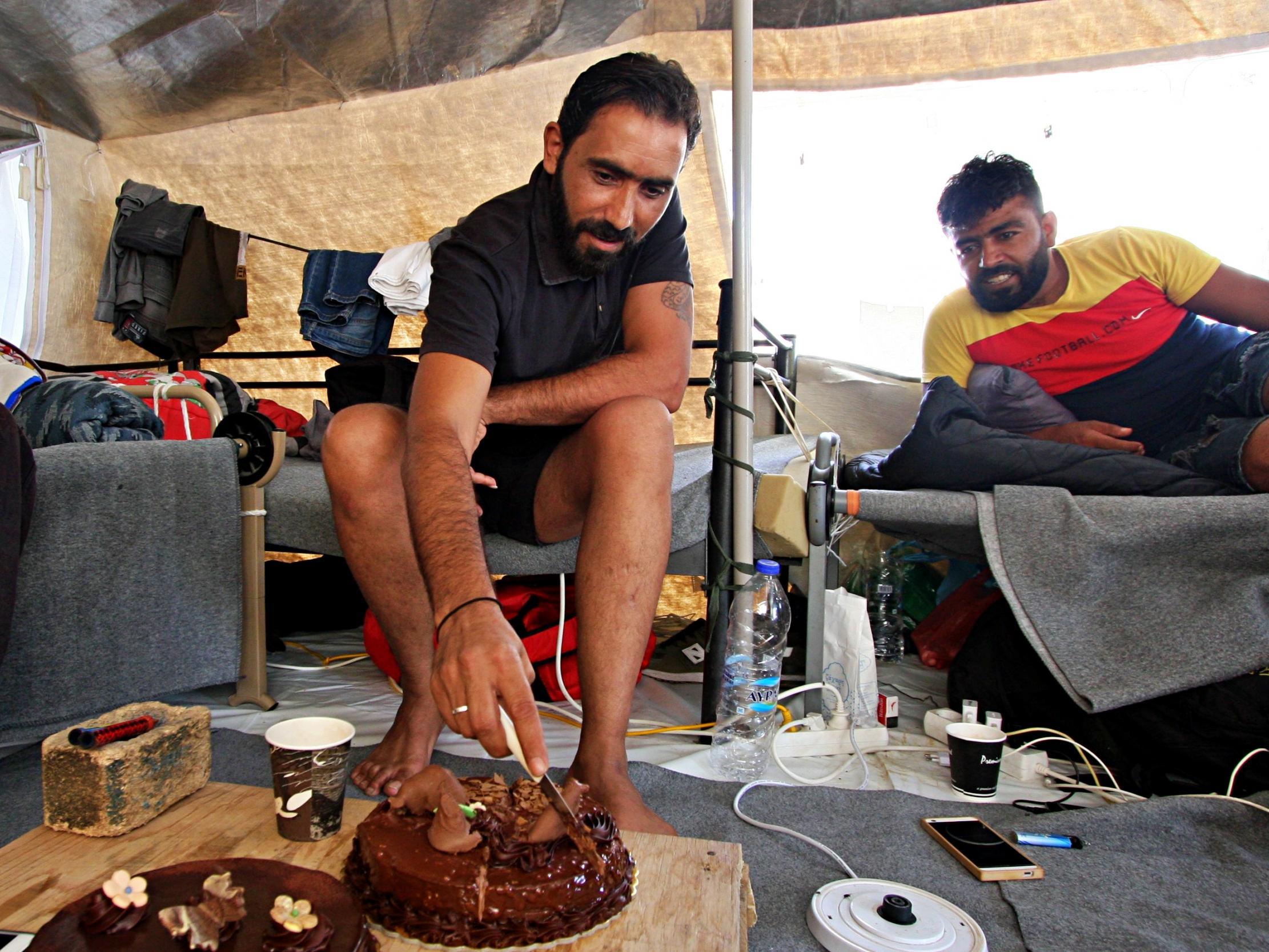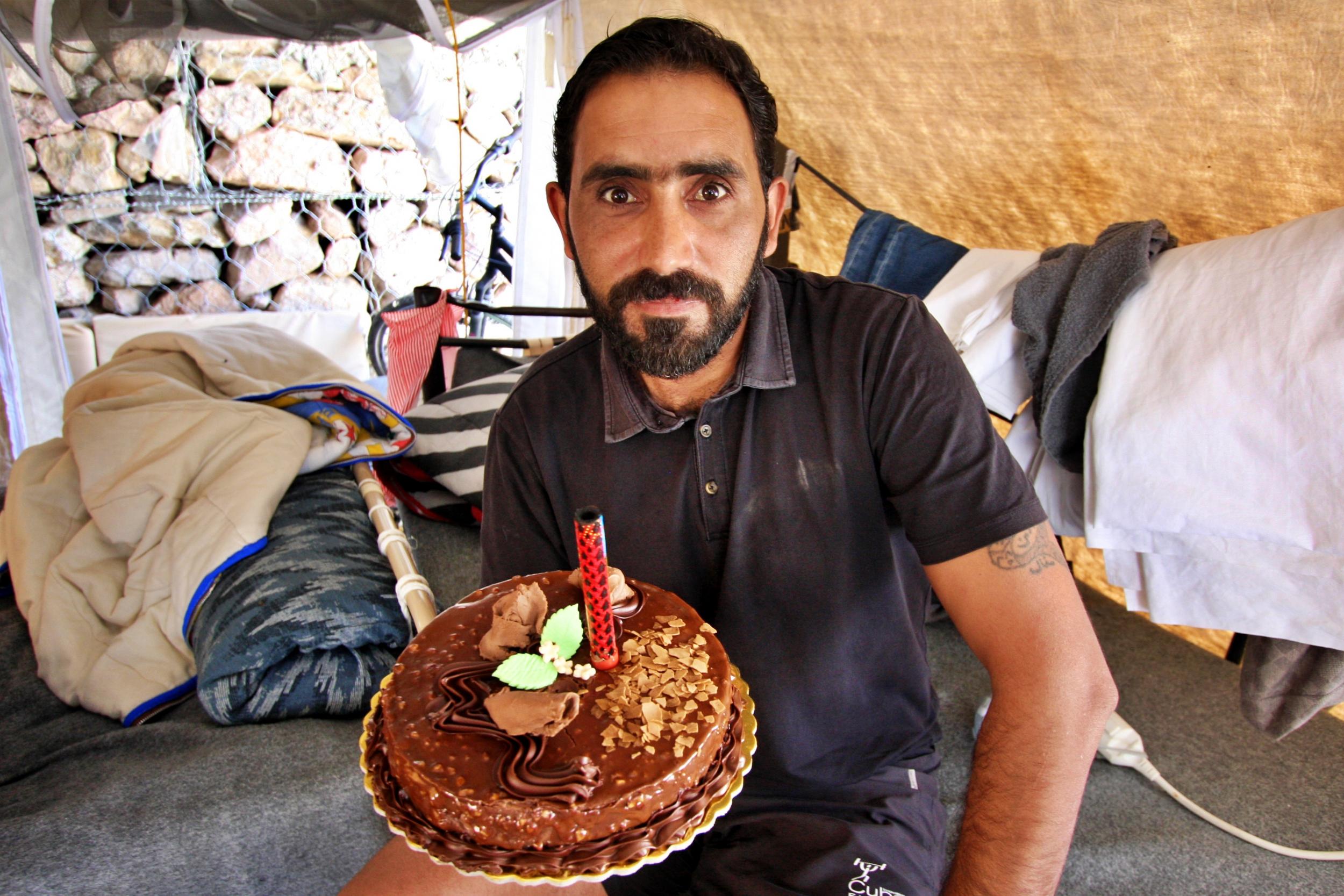‘I’m desperate to reach him’: Syrian trying to save brother in UK stranded in Greek refugee camp
Zaki Mohammad Ali says he wants to travel to London to donate his kidney, and is then happy to leave once again: ‘Helping my brother is the most important thing’

Your support helps us to tell the story
From reproductive rights to climate change to Big Tech, The Independent is on the ground when the story is developing. Whether it's investigating the financials of Elon Musk's pro-Trump PAC or producing our latest documentary, 'The A Word', which shines a light on the American women fighting for reproductive rights, we know how important it is to parse out the facts from the messaging.
At such a critical moment in US history, we need reporters on the ground. Your donation allows us to keep sending journalists to speak to both sides of the story.
The Independent is trusted by Americans across the entire political spectrum. And unlike many other quality news outlets, we choose not to lock Americans out of our reporting and analysis with paywalls. We believe quality journalism should be available to everyone, paid for by those who can afford it.
Your support makes all the difference.Chocolate birthday cakes, each with a sparkler squidged into the middle of them, are carried into the tent amid a chorus of “Happy Birthday” followed by clapping and cheers.
It is the 35th birthday of Syrian refugee Zaki Mohammad Ali. This year’s celebrations are a far cry from where he imagined he would be today, however.
He expected to be in London by now, donating a kidney to his severely ill younger brother Kamel, having risked his life several times in the last 17 months during his attempt to get there.
Instead, he is spending it stranded in Moria refugee camp, located on the Greek island of Lesbos, in a tent that he shares with nine other people. He feels totally hopeless, he says, and is growing increasingly concerned for his brother’s welfare.
“I’ve been here since 3 May. I made some scary decisions to get here and I had no idea I would be unable to leave the island to get to my brother.
“I’m desperate to reach him but all I can do is wait until the Greek authorities allow me to pass to Athens where I can apply for entry to the UK,” he says, holding up pieces of paper detailing his brother’s medical information.
In a meeting this summer between several Syrian families and the then immigration minister Caroline Nokes, Kamel’s wife raised the case – but Nokes apparently said there was nothing she could do.
Organ donors can apply for a medical visit visa but both brothers said they had not been made aware of this.
Nokes did not respond to a request to comment from The Independent and a spokesperson for the Home Office said it did not comment on individual cases but added that anyone with refugee status in the UK “has full access to medical treatment”. Application for a medical visit visa would also have to be carried out in Athens, the Home Office said.
The two brothers, along with other members of their family, were forced to flee Syria as a result of the war. Ali and his wife left for Lebanon in 2011 and his brother Kamel followed with his family three years later.
I made some scary decisions to get here and I had no idea I would be unable to leave the island to get to my brother
In March 2017, Kamel was diagnosed with kidney failure. Due to the severity of his condition and with medical treatment being so costly in Lebanon, he was granted asylum in the UK, with his family, to seek medical care at St George’s Hospital in London.
Since moving there in June 2017, Kamel has undergone dialysis three times a week, every week. He is unable to work, unable to make plans and travel is difficult – he was not able to attend his mother’s funeral in Sweden earlier in the year.
Ali began his perilous journey to Europe in April 2018, managing to evade arrest as he travelled through Syria – where he says he would have been forced to re-join the regime’s army had he been caught – from Lebanon. He then crossed over into Turkey and travelled to the northwest where he made two failed attempts to enter Greece over land.

“I was stopped both times by the Greek police. The first time I spent 22 days in a Greek detention centre before they sent me back to Turkey and the second time I was held for three days by the Turkish authorities,” he says.
With funds dwindling, he had no choice but to embark on a terrifying boat journey to Lesbos – the cheaper option.
“I was determined to make it, there was no other option. Trying to help my brother was worth the risk – I would have walked to the UK if I could,” he says.
When he finally hit the shore of Lesbos he says he felt mixed emotions – relief at finally reaching Europe but also fearful of being sent back.
“I called my mother as soon as we landed and told her I was safe. She told me to come and visit her,” he says, having not seen her since last year. Tragically, she died the next day.
Since then, Ali has faced a daily battle between feelings of hopefulness and despair, he says.
His wife is still living in Lebanon and he says he has no issue returning there following the transplant procedure, should that be a condition of his entry to the UK.
“Helping my brother is the most important thing,” he says.
Although it is unusual for kidney failure patients to require an urgent transplant, as is the case for heart or liver transplants, dialysis is crucial to keep them alive. However, the average life expectancy of someone undergoing dialysis significantly decreases while also dramatically increasing the likelihood of developing heart disease.
Currently around 4,700 patients are waiting for a kidney transplant in the UK, according to NHS Blood and Transplant data. A transplant from a relative is more likely to offer a better match than someone who is not related: in addition, kidney transplants from a living donor have been proven to last longer.
In an email seen by The Independent, Kamel’s doctor at St George’s hospital in south London urged the Greek authorities to facilitate a reunion of the brothers.
Speaking to The Independent via telephone from his home in London, Kamel says a transplant would be life changing.
“I was fit and healthy until suddenly I was very sick one day. My wife begged the UN for help because we couldn’t afford the medical costs in Lebanon and luckily we were granted asylum,” he says.
The few thousand he had in savings, alongside money he borrowed, helped them set up their new life in London.
“Life isn’t easy but the most important thing is health. Money comes and goes, but I need to stay around for my kids,” he says. “My wife has left her family behind to be here and help me. My nine-year-old daughter said recently that she wanted to train to be a ‘kidney doctor’ so that she could help me.
“I want to get better, I want to work and I want to build a better future for my children.”
Greece’s government announced at the end of last month it would accelerate transfers of asylum seekers to the mainland and deportations of those rejected, amid mounting pressure to deal with the escalating number of refugees landing across the Aegean Islands.
Following the announcement, 1,500 people were moved from Lesbos to the mainland. However, 102 boats arrived on Lesbos during the whole of August, according to Norwegian charity Aegean Boat Report, and the population of Moria refugee camp remains around 10,000 despite its 3,000 capacity.
Greek authorities have not responded to a request for comment on Ali’s case.
Join our commenting forum
Join thought-provoking conversations, follow other Independent readers and see their replies
Comments